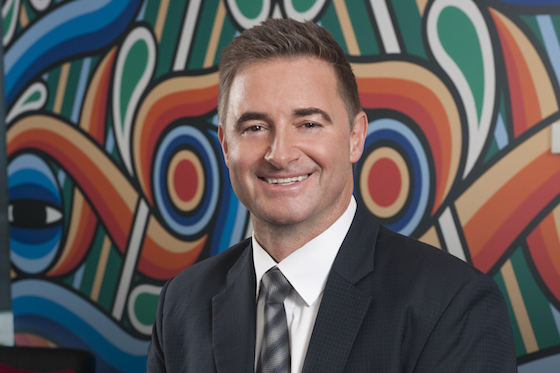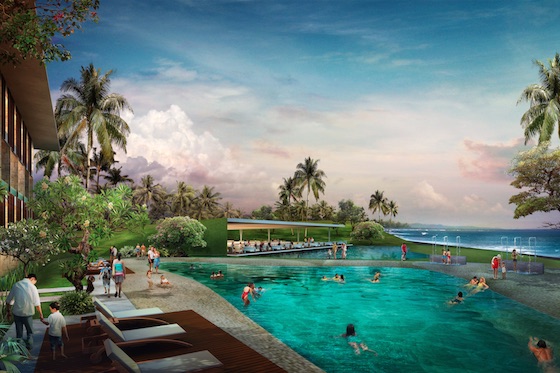Wyndham Hotel Group is now setting sight on huge growth in southeast Asia, where it admits it’s been “a bit slow off the mark.” Moves include relocating Vice President of Acquisitions and Development David Wray from Australia to Singapore, while a new partnership with former Best Western International’s head for AMEA, Glenn de Souza, who has set up his own management company, Kosmopolitan Hospitality, has in one fell swoop already yielded nine hotels in Thailand, Vietnam, Myanmar and Japan under the brands Wyndham, Ramada, Tryp by Wyndham and Days Inn.
Barry Robinson, president and managing director, Wyndham Vacation Resorts Asia Pacific and Wyndham Hotel Group southeast Asia and Pacific Rim, believes the pure hotel management side can double in southeast Asia within a year, while the vacation ownership business can grow by at least 30% per annum in Asia for the next five years. HOTELS spoke with Robinson about his strategy.
HOTELS: Wyndham has grown a lot in China, but not southeast Asia. Why now?
Barry Robinson: There are lots of opportunities. We had only a sprinkling of hotels in Indonesia, Malaysia, Thailand and Vietnam and, with just a bit of focus last year, we more than doubled our presence in those markets. We should be having 150 hotels throughout southeast Asia already.
In total, outside China, we’ve signed just under 40 hotels last year, a mix of management and franchises but more management. My personal opinion, not the company’s, is we were a bit slow off the mark and my main goal now is to accelerate growth in the region. I’ve been passionate about Asia and southeast Asia, I supposed now I’ve convinced the company to give me the keys to the car.
H: What’s the strategy to grow in southeast Asia? Will you be partnering more small independent hotel management companies such as Kosmopolitan?
BR: We’ve got more staff here (in Singapore) and my head of development, David Wray, has just shifted to Singapore, from Australia. He has both the development people in Australia and Asia reporting to him. This office in Singapore is our headquarters at the moment. We’ve busted our space within eight months of setting it up.
David was the one who built the partnership with Glenn (de Souza, founder of Kosmopolitan), who has a lot of experience in the region and strong relationships with owners. I like Glenn’s approach but we’re not going to be solely locked into Glenn. There are lots of independent management companies that are starting up and they need distribution, although some more passionate about using their own brands, in which case we won’t be partnering them. We will also work directly with owners; we can consider buying a group. We’re going to look at any opportunity to accelerate growth that presents itself.

H: Which brands are you intending to grow in southeast Asia?
BR: Wyndham, Ramada, TRYP, Days Inn, Microtel – the master in Philippines is doing a great job – and possibly Howard Johnson. What we’re seeing is that our strong presence in China, where we have more than 1,050 hotels open and running under five brands, is now helping our development outside China.
There are 100 million-plus people flowing out of China and visiting Asia and they are following recognised brands such as Ramada, which has a strong presence in the four-star market in China. Days Inn and Super 8 are also solid three and 3.5-star economy brands which are growing in China. In Malaysia last year, we signed up eight or nine hotels. We’ve just taken over two hotels in Indonesia, in Jakarta and Bali, and opening a brand new Wyndham, the first in Bali, in April, which we’re managing. With Glenn, we made good inroads into places like Halong Bay, Vietnam, which is another Wyndham, and that’s managed by Glenn’s company. So, it’s a combination of us managing and partners managing.
H: Are you also growing vacation ownership?
BR: Oh yes. I first joined the company 14 years ago when it was still under Cendant and took over the timeshare business for South Pacific. Four years into the role, I started to blend timeshare with hotels, my mixed-use model.
We entered Asia last year with our vacation ownership model, with the first acquisition of Wyndham Sea Pearl Resort Phuket, which is spread over 15 to 20 acres (6.07 to 8.09 hectares). We bought 25% of the stock and own about 40 units which we run as timeshare and the rest (210 units) as a normal hotel. That gives me a secure position as the timeshare club we started in Asia is a four-year-old club that lasts for 40 years, so we have the asset for 40 years and that’s also the terms of our management agreement.
The mixed-use model was what helped me secure strategic locations such as Melbourne and Sydney and enables me to control my destiny. In Australia, the club runs for 65 years so I’m managing the resorts for 65 years – it’s not like 10 or 20 years like with the other chains. So, our strategy is growth for both businesses. Vacation ownership is a very successful component of our overall worldwide global business.
H: But vacation ownership has such a bad name in Asia.
BR: That’s because the international players have not been in the marketplace, and there has been a lack of governance. We, Marriott, Starwood, etc, are trying to talk with governments and bodies like RCI and Interval to forge workable legislation that will mitigate somewhat the exposure to consumers by fly-by-night operators.
For example in Australia we were wrapped into the financial investment sector, yet we’re not a financial product.
We’ve got a couple of caveats from governments (in Asia) that aren’t meant for our industry. Singapore’s legislation (on vacation ownership) is not workable at the moment and we have started dialogue with the government. In Thailand, Hilton has started talking with the government there. We need to explain and educate governments and consumers here in order to grow the sector. Besides the product is now moving towards lifestyle solutions; it’s not just about buying a timeshare holiday. There are lots of add-ons, like a concierge service, online discounts for groceries, restaurant deals, theatre tickets discounts – and all these not just when you go on holidays but are part of your lifestyle membership.

H: But who buys vacation ownership these days?
BR: Everyone. In the old days it used to be a pretty standard product – nice, but your usual one-, two-, three-bedroom units. Now the product is so wide. We have four-bedroom presidential units with plunge pool, chef’s service, all the bells and whistles. The one in Fiji that we built a few years ago is the best product on the island; no one has the size of units with private plunge pools that we have. So while before we catered for middle of the road travellers, and families, now we’ve got, say, singles wanting to go to different destinations and stay in our hip hotels, or wealthy people predominantly using our presidential product.
H: Why would they buy vacation ownership?
BR: Because it’s somewhat forces them to take holiday. Secondly, even some of my wealthy clients are saying they are sick of owning two or three holiday homes and when turn up there’s always something wrong. They use the presidential villas and know when they turn up, everything’s going to be fine. No hassle. Plus they can let their friends use it; It’s easy to transfer. And it gives them variety – they don’t have to go the same place for a holiday.
H: Even in this age of Airbnb?
BR: We are an Airbnb, we started before them! It’s the same thing, condominiums, and in fact our service is getting better. When people ask if I’m worried about Airbnb, yes, of course but no more than the normal worrying about competitors. Although I do say shame on us because we should be smarter and better at shouting about how our product has changed.
H: So, where in Asia do you see opportunities to grow vacation ownership?
BR: Thailand, Indonesia and Japan.
H: Why should owners go for it?
BR: There is synergy for owners in mixed use. We give them greater yield for their asset. A vacation ownership property typically runs at 80% occupancy – my Fiji resort runs 95% each year because it is prepaid and it forces members to vacation. So in economic boom and bust cycles, you have a stable environment. In downturns, people still use their vacation ownership. Secondly, the levies they pay go towards running the property – common areas, reception check-in, and so on. When you run the rest of the property as a hotel, you can yield up because part of your cost is already paid up by the vacation ownership members.
